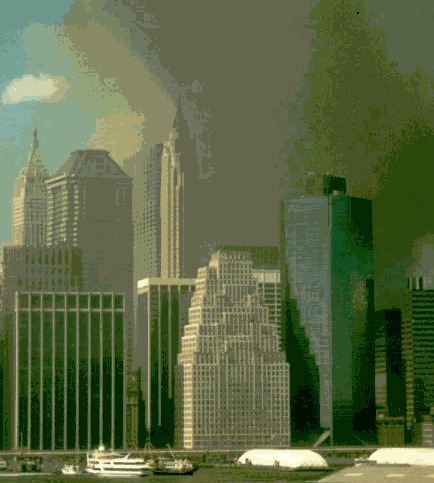
Essays
The Artist and the Nobility of Conscience
by James Ragan
Violas are Grey, Trumpets are Gold:
Composer Paul Winston Responds to "Angels and Necessary Ambiguities" (Essay, Sep '01)
9/11: Photo Essay Composed on the Brooklyn Heights Promenade
by Robert Bové
~ . ~ . ~
The Artist and the Nobility of Conscience
by James Ragan
It has been said that man's innate proclivities for creation and destruction are so inventive and so apocalyptic that in their genius lies the "unwritten" testament to man's future. It is to his art, however, to his prose and poetry, the "written" testaments of man's place in his universe, that we turn for truth and understanding. If man is to survive such creations of his own undoing, as the threat of nuclear and chemical arsenals or the god-science of biotechnology, an entirely new creed of morality must be proposed, and it begins with the artist, who has in the past fashioned our most durable foundations of communication and, by extension, morality. It is in the environment of the creative mind that a new morality will inspire global communication designed to retard or arrest the technological advances which threaten man's already fragmented psyche. The artist, by nature, must represent a standard of nobility, bound at the core of his being, by passion and compassion.
Our present goal as impassioned, free-thinking members of a community of artists is to return to our trust in literature, and to celebrate our freedoms to pursue the standards of the nobility of conscience. Like Descartes, we know that the mind thinks. However, we must face the truth that it does not necessarily improve--unless we choose to improve the environment of the imaginative and creative functions of the mind, afforded us by the metaphoric powers of language. Language with its mirror into the ecology of the mind has in recent times been debilitated by cynicism and is too long in recovery.
From the Sixties on, language had been in the process of "telegenic revivification." Perhaps due to a post-Kennedy anti-intellectualism, the new life revived in a devolving language during the Nixon years was media-inspired, script-annotated and sound-simplified, suitable for television's instant broadcast and audience consumption - and sadly destined for semantic collapse.
"Instant imaging" like TV's instant sound bite has become the vehicle for instant truth and gratification. This telegenic impulse to immerse us, as Octavio Paz suggests, "in the now that never stops blinking," to, in effect, "instantize " or "formulize" the visual image at the expense of truth and "context" has provided the impetus for the public's movement away from books and book reading.
The "instant imaging of truth" has also contributed to the misdirected goal of arresting or pacifying the imagination. It is the media's rush to instant truth without context that has paralyzed our nation's need for reflection. And art has always demanded context and reflection. Instead of the artist's mandate to disturb the imagination on levels that metaphor has the power to achieve, today's writer runs the risk of revivifying language with an immediately recognizable, multi-visceral, cliché-bound vocabulary consistent with and suitable for the anti-intellectual trend in today's culture. For the "you know?" generation weaned on tabloid cynicism, television, and cyberspace, the technology of "instant imaging" has supplanted the polysemy of the written word. We have ceased to become a country of ideas. The data-base has replaced the dialogue. We are data-basing ourselves into mental atrophy.
In 1985, I was invited to read along with Bob Dylan, Seamus Heaney and Robert Bly for Mikhail Gorbachev at the First International Poetry Festival in Moscow. Where once there existed a systemic starving of the intellect for an entire generation of Soviet artists, glasnost has served for them to free the encumbered spirit. I began the performance with the assessment that one of the still sacred powers of the artist in any period of intellectual recession is the ability to move and shape the minds of kings (world leaders), who in turn move and shape the minds of society. While sadly, at times, it appears there are no kings (world leaders) with minds willing to be moved -- or, perhaps, writers seem no longer inspired by that intention -- it still remains for the "artist," that beleaguered and irrepressible shaman of image and language, to persist in the pursuit of universal truth, no matter how irascible or anti-cathartic society remains in its response.
In a recent CNN interview I voiced a tangential concern: how to protect and nurture the power of the written word in a society suffering from the paralysis of cynicism in our tabloid, media, and politically inspired era of intellectual recession. In these troubled times, more than ever, how to protect and nurture the creative spirit is the writer's dilemma.
Throughout the years, I've asked students in my personal interviews to reflect on their goals as writers. I urge them to pursue a goal which would lead each to the ambition of wanting to be the "best and most inspired voice of truth in their generation." I remind them that society and the artist by nature needs again to celebrate our freedoms, particularly in the pursuit of the standards of conscience in order to reject what has become the oppressive contentment with ignorance, abundance and mediocrity.
Years later, I'm happily reminded by these students of the profound effect my words had on their lives and careers. What continues to inspire me after reading of our many students' successes is that the USC Professional Writing Program is committed to achieving one objective - of being collectively the best creative voice of its generation. I join our faculty and current graduate students in congratulating all the alumni in this, our 30th anniversary year, for contributing to this goal by continuing to search for excellence in the celebration of the standards of conscience. For their numerous distinguished publications and productions, I commend them as they continue in their roles as leaders of the vision into the 21st century.
Dr. James Ragan The following are thoughts engendered by Maureen Holm's insightful essay ["Angels and Necessary Ambiguities," Oct '01], a piece conceived--at least in part--as a responsive companion to my own ["Against the Imaginary," Oct '01].
1) "Form-specific": By this, I assume she means the characteristic of words or music to mean only what they can, not their capacity (or lack of it) to imply a larger formal context (prelude vs. sonata/sonnet vs. epic).
2) "Craft": She and I may be using the word in different ways. When I use it, I mean only the bare capacity to write what one has to say. This, to me, is no more than being able to spell "c-a-t," anything beyond which, I would put under "context."
3) "Consciousness": I'm afraid that I don't use the term as (perhaps) a Zen Buddhist might, that is, the entire mind aware of itself. And that, probably, is not how Brahms used the word either, at least on this occasion.
Let's take, for example, the first four notes of the first movement of Beethoven's Fifth Symphony as compared with the first four notes of the march movement of same. The harmony is changed, but that's illustrative of my point. They (forgive me for my urban vocabulary) do not come from the same place in the mind. The first is heroic/serious/angry, fist on the table and all that; the second is heroic/martially forward-moving. The first is individual and philosophical, the second collective and aggressive. The first is passive and exemplifies stasis, the second is active and volatile. Scriabin may have called the first "black or grey," the second "gold."
But of course, violas are grey and trumpets are gold anyway.
4) "Pure sound": As a musician, the phrase would perhaps carry a different meaning to me, although Schoenberg, whom I personally place at the pinnacle of musical thought, believed that such a thing was possible in music--that works could be communicated through the color of their instrumentation alone, a concept which, to me, drops off the edge of the earth into a pre-Sumerian vapor. I do not think the realm of pure sound is the purview of either music or poetry. (I have heard Ms. Holm's songs performed in her invented language and was impressed, but, to tell the truth, I thought it close enough to the Slavic tongue to still be "literature.")
5) "Audience imagination": Holm writes that Stevens "anticipates the role played by the imagination--of both artist and audience." In my business, that of the musician who writes for people, my intention always in any passage is very real, very concrete, and deliberately limited.
Program Director
USC Professional Writing Program
Los Angeles
[The foregoing was adapted from a recent address. Reprinted with permission of the author. Eds.]
Essay
Violas Are Grey, Trumpets Are Gold
by Paul Winston, composer
When I began "Beauty and the Beast" [PW's full-length ballet], I was very much impressed by Balanchine's dictum, by which he means, of course, that the art of dance precludes clarifying relationships between the heroine's first and second cousin. As a matter of fact, there is a mother-in-law-to-be in "Beauty," and she's obvious enough, but, true to my intention at the time, the emotional core of the music at any given instant is simple: disappointment, loneliness, pride, fury, … you name it.
And yes, it could be "philosophical" or even "philosophical-ruminative-downhearted," but if someone listening to a melody which, for example, is made up of wide leaps, the emotional tenor of which might be, say, "joy," and instead mistakes the trees for the forest and hears "a stormy ocean," that's not my fault. Such people, God save them, are like those painters whom Donald Francis Tovey lampooned as "artists who put the brown cow next to the green tree."
When I have made my artistic point, my job is done. I have "created the consciousness of my race" (or however it goes). The important thing is to make it impossible, or nearly so, for the race to dislodge my creation from itself because, if it does so, it commits suicide. That is where the biology of creation comes in.
6) "Fundamental poetry": When Mr. Stevens spoke of "a fundamental poetry even earlier than the ancient world," perhaps he meant the "third eye," or overview, which I have to think existed long before the Greeks. Picasso said he found African art "as intellectually satisfying as any other," and his own use of it certainly validates his point. I personally don't know of an artistic conception older than that--that is, the intellectual habit of distinguishing one's creation from the world, of visualizing the creation as higher than one's surroundings, of making the total separation (false, to be sure) of artist and what is ordinarily perceived.
Although I don't begrudge Mr. Stevens his ambition, his invocation of a time "before the world began" reminds me of two concepts which I try to make it my business to transcend as an artist. The first is God, which I translate solely as "what lies beyond the envelope" (that which makes us strive, which is fine); the second is who or what doesn't have the foggiest idea of what I'm trying to accomplish. Because of this very personal stance, I believe Mr. Stevens's concept approaches Schoenberg's idea of "pure sound" which, for a musician, is inaudible--and useless even if it could be heard.
~ . ~
9/11: Photo Essay Composed on the Brooklyn Heights Promenade
by Robert Bové
[The first and second photos show the scene at 9:20 a.m., the third at 4 p.m.
on 9/11, the fourth at 4 p.m. on 9/12. Well-known Brooklyn poet Robert
Bové contributed to the "Degrees of Apprenticeship" feature on the
Brooklyn College MFA Program (See Archive, Dec '00). Eds.]




~ . ~ . ~